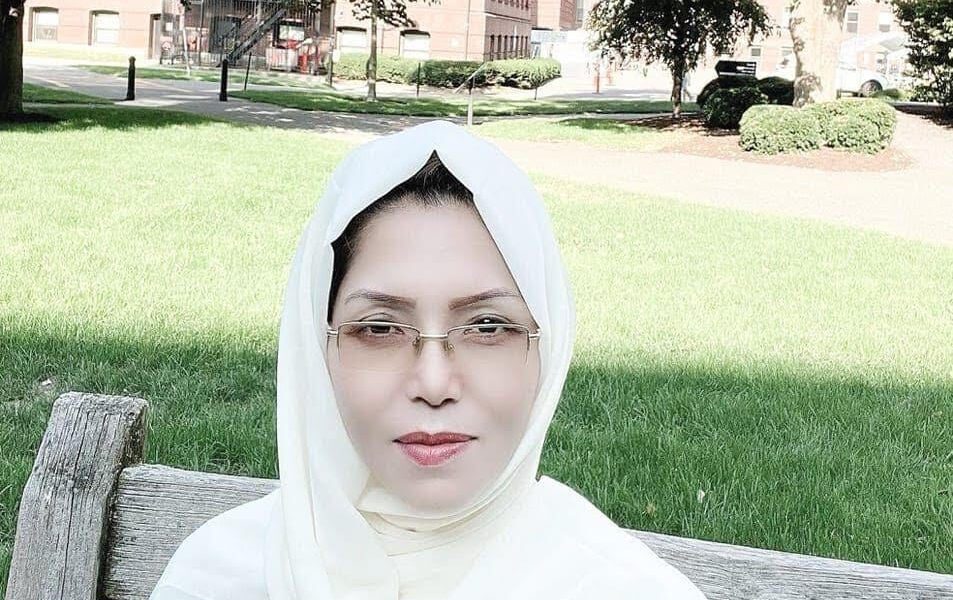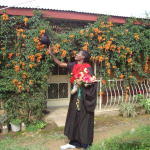Championing women’s rights: the story of Mastora Shafahi
Nearing the border between Afghanistan and Pakistan, Mastora Shafahi, a renowned Afghan midwife, ran for her life as she fled her home, now occupied by the Taliban. She needed to reach somewhere safe, even if that meant crossing the Taliban-controlled border by foot. The strength of the mountain wind caused her headscarf to wave. Nonetheless, her eyes trailed the red-marbled mountains as she walked. Freedom was guiding her. The next minute an unsettling sound erupted, and she was faced with armed soldiers. Their faces were completely enveloped with jet-black face-scarves. In assaulting voices, they demanded her personal information. Their eyes narrowed in disapproval, and she was detained to a cold and inhospitable prison cell.
All at once, Shafahi was desperate, belittled and scared. Yet she did not lose hope.
For Mastora Shafahi, Bamyan Province, filled with blue streaming waters and orange-marbled mountains, is home. A childhood with strong and hardworking women made Shafahi appreciate the occupations reserved for women in Afghanistan. She saw mothers and grandmothers deliver babies with their bare hands. Childbirth at home or in small local hospitals was how most births were conducted in Afghan villages. She wanted to help women in her country actively by aiding them in completing their families and ensuring their right to health.
Once she completed her primary school education, she left her small province for the University of Kabul where she studied pharmaceutical research and midwifery for four years. Once she received her Bachelor of Pharmacy, she earned her master’s degree in rehabilitation sciences at the University of Dhaka in Bangladesh. “I did this so that I could specifically support women in Afghanistan,” said Shafahi.
Her advanced experience in the medical field led her to serve as the general manager of the Afghan Ministry of Public Health, a United Nations (UN)-based establishment focused on providing advanced medical care to Afghan citizens. Shafahi informed the ministry about providing safe births through using the midwifery techniques she learned and strived to make the community of midwives in Afghanistan more unified in their methods. She also advocated for equal access to educational opportunities and worked to provide scholarships for Afghan women pursuing a career in the medical field.
She put detail into each one of her ideas, especially when ensuring proper access to medicine and health products for all genders. Most of all, she wanted people to feel the changes she implemented.
Despite having a high position in the medical field, she identified the various flaws within her country’s medical setup. Her unique perspective allowed her to see how women in less powerful positions were limited in midwifery and other medical fields. According to Shafahi, in Afghanistan, women are traditionally discouraged by their husbands from working, which means that hospitals and medical facilities were mostly male-dominated. Since she was not married, Shafahi lived in a “widowed facility,” a shelter that housed unmarried and widowed women. Shafahi did not feel at home or respected during her time there. “All the time, most of the people punished me because I was a woman who wanted anything.” They often ridiculed her, questioning: “Why do you work outside? Why do you continue your education?”
Strict Islamic law worsened as soon as Kabul fell to the Taliban on August 15th, 2021, following the US military withdrawal from Afghanistan. The Taliban, a Sunni Islamist nationalist group, occupied province after province in Afghanistan, continually regrouping until they achieved full control of the country. With the Taliban taking over, resources for healthcare, employment, and educational resources significantly diminished, putting Shafahi and other doctors in positions where they were severely restricted and understaffed. Since the takeover, the Taliban have released 54 edicts restricting the rights of women. Two years on, they have succeeded in prohibiting women from visiting most public spaces, including parks, gyms, and beauty salons. Most importantly, girls over 12 are prohibited from pursuing education, and women have been banned from most careers. Every day, Shafahi worries about her sisters and family members living in Afghanistan. “It is really hard for girls. For more than two years [my sister] hides. She is not allowed to go outside.”
Shafahi’s family was under increased danger due to their Hazaran ethnicity. The Hazaras, an ethnic group native to Afghanistan, have been subjected to genocide and exclusionary acts barring them from living in the region. The climate of ethnic nationalism leading to the Taliban’s takeover drove a hate campaign, resulting in increased threats toward the Hazara people. “Most Afghan people try to kill a lot of people [Hazara] because they think they are not Muslims. We are different. We are not from Afghanistan…They are killing Hazara, they are killing men as well as they are killing women Hazara, they are killing educated Hazara…six months ago 68 Hazara girls were killed, because Hazara people, they like freedom, they like to respect all people.” Shafahi was among the Hazara who took a strong stance on these values and feared the possible risk of persecution.
Shafahi’s family still in Afghanistan do not feel safe leaving the house, due to uprisings and hazardous incidents. Three years ago Shafahi’s younger sister was a victim. Due to her passion and support of Hazaran values she was abducted by an unknown person. It has been almost three years, and Shafahi and her family still do not know the location of her sister. Shafahi highly believes the abduction of her sister was due to her sister being a Hazara woman.
Even before the Taliban takeover, amid turmoil, extreme sexism, and harassment due to her profession, Shafahi had an exit plan in mind. She knew her country could be in a shaky and unstable situation at any time.
Before the uprising, she had found the Scholars at Risk program.
“I applied and, because of my background and education,” including her work for the Ministry of Public Health and her activism on social media, “they accepted me,” said Shafhai. Now she needed this opportunity more than ever.
Shafahi spent the whole day at the border in a room with a hard-rock floor and a thick white plastered wall. Luckily, there was still an electronic item with her that they had not taken away.
It could help. The phone.
Shafahi scrolled through her contacts list until she found Jane Unrue, Scholars at Risk’s program director at Harvard, and called, hoping for a response.
After a single tone, Unrue answered. In an urgent situation, Shafahi didn’t even have time for “Hellos” and “Where are yous.” She informed Unrue of her current location, saying that she feared for her life. Unrue, who had experience with such high-stakes situations, called an Afghan friend who managed to bail Shafahi from prison. The plan worked smoothly. Shafahi rushed to reach safety in Pakistan. She took temporary refuge in Dubai until everything was set up for her arrival in Cambridge. In May 2022, she began her job at Harvard as a part-time research fellow.
Unlike the typical job setup, Shafahi’s work takes place during the night. Every day after sunset, she works for UN WOMEN. She represents a vibrant voice for the cause of women’s rights in Afghanistan. Shafahi says that most people know about her support, as she is “married” to the organization. There are different working set groups separated based on occupation, in sponsoring these projects, including a midwifery and physician set group. As of right now, Shafahi is advocating for equal pay for women in Afghanistan. She is planning to achieve this goal by sending in resolutions to the UN that urge organization leaders to bring new policies into businesses and organizations in Afghanistan. Along with a friend from Canada, Shafahi is working on a project for International Women’s Day, with help from the United Nations, to raise awareness of the harsh realities of how the Taliban rejects the autonomy and freedom of women, and to bring together women impacted by the situation. Shafahi also works with other women in the same group to set up programs that work toward creating a movement in line with her Women’s Day project.
Shafahi makes it clear when talking to the UN and various human right organizations that “the men in Afghanistan, the Taliban, do not respect women. They treat women like they are all the time at home. They do not treat them like human beings.”
So far, Shafahi feels at home and welcomed in the Harvard Scholars at Risk community. “It has been very good for me. When people move to another country, everything is strange; for me everything was easy. Everything was very straight and lovely.” Shafahi has learned a lot through the support of her colleagues and mentors. She is especially grateful for Jane Unrue, who helped rescue her when she was under arrest. Now that they have finally grown to know one another, Shahafi describes Jane as simply: “amazing.”
America is a safe haven for Shafahi. It is different from Afghanistan, as both women and men are encouraged to pursue their own professions. She feels safe and secure and enjoys her colleagues and friends who keep her going every day. Most importantly, she is pursuing the ability to experience her education freely without repercussions.
Despite living in an accepting and free country, she has never stopped thinking about her family and the terrifying environment for women in Afghanistan under Taliban rule. She knows it is in her hands to guide the Western world to understand what women in Afghanistan are forced to endure every day. Through her work, she knows that she is leading change for women across the globe, building a better world not only for herself but on behalf of all the women out there with dreams of living in a free world.
This article is part of a collaboration between Teens in Print and Consequence Forum to highlight the effects of war on people. For more stories like this, visit: Consequence Forum.










